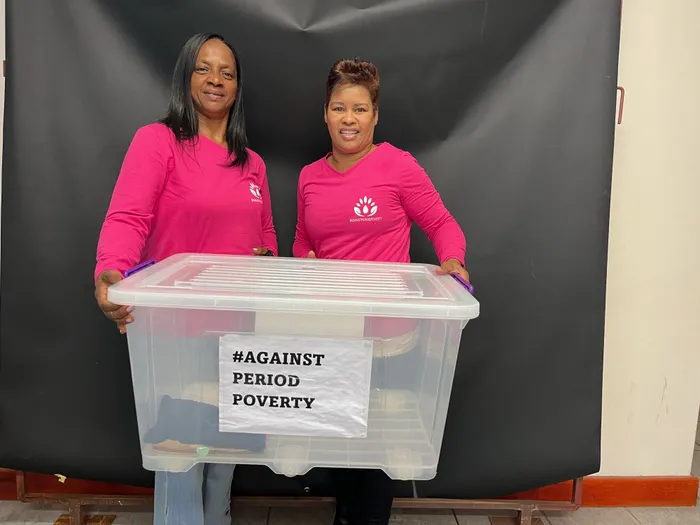Westridge designer wages war against period poverty

#Againstperiodpoverty secretary Glynis Lindt, from Rocklands, and founder and coordinator Lindsay Adams, from Westridge.
A Westridge interior designer is heading a campaign to help girls attend school regularly even when they have their period.
Lindsay Adams founded #Againstperiodpoverty, an organisation visiting schools across the Western Cape to talk to girls in primary and high schools about their monthly menses and replenishing sanitary towel stocks.
She would like to have a sanitary towel dispenser and incinerator installed at a Mitchell’s Plain school by the end of the year.
Ms Adams said it would be operated with tokens, which teachers would keep a record of to assist girls when they needed sanitary towels.
Last Tuesday, August 14, the Plainsman met Ms Adams at Mitchell’s Plain School of Skills, where she spoke to a group of girls about caring for themselves, understanding their bodies and being confident to ask for help.
“Only when you speak out can we break the stigma and know that you need help,” she said.
Ms Adams, who works for an international hotel group, said while working from home in 2019 she spotted two girls, on different occasions, at home regularly.
“I have a rather good relationship with the young girls and boys in my street and young people in general. So, I approached them and asked them why are they not at school. And they said to me because they cannot afford pads,” she said.
“This laid on my heart and God spoke to me to plant back into the future leaders, women, the backbone of society.
“They are the future nurses, doctors and lawyers who are not at school now,” she said.
Over the last four years, Ms Adams has networked and garnered support from companies, who are only now coming on board to supply sanitary towels at reduced costs which she can drop off at schools.
She has also connected with non-profit organisation IAMFORHER Foundation.
Ms Adams has been on various media platforms to garner support for her plight to keep girls in school.
It was during a radio interview that she connected a woman who sews little pouches wherein the girls can pack their sanitary towels.
“While on this journey, various women have reached out to me and have shared the opportunity to care for our young women,” she said.
Ms Adams said often the girls were too shy to speak out in the group but came up to her with some questions and also sneaked a few extra sanitary towels from the box.
Western Cape Education Department (WCED) spokeswoman Bronagh Hammond said while dispensers have worked at some schools, it was more effective to distribute the products when required or monthly.
“We have received reports that dispensers can be depleted quite quickly, learners take more product than required, for instance, to take home for other family members or friends,” she said.
Ms Hammond said the use of the dispensers should be monitored to determine if a different system should be used.
“The WCED is aware that some female learners are absent when they are menstruating.
“This affects mainly our poorer learners who cannot always afford the products required to manage their menstruation in a dignified and hygienic way,” she said.
She said the extent of absenteeism was not known as pupils did not necessarily report to schools that they were absent because of their menstrual cycle.
“So we cannot provide statistics in this regard,” she said.
Ms Hammond said these pupils needed to be supported.
“Female learners should not have to lose out on precious learning time, due to the fact that they are menstruating,” she said.
She said the department was concerned how this affected their school attendance monthly and thus their opportunities for a good education.
“We are engaging with the provincial department of social development (DSD) on their Sanitary Dignity Project,” she said.
They remain open to corporate or other forms of investment as well.
“If any companies or organisations would like to fund such an initiative then they must please engage with the WCED or DSD,” she said.
Esther Lewis, DSD spokeswoman, said their departments continued to work together to assist girls with sanitary products.
Through the department’s Sanitary Dignity Project, they provided sanitary pads to 302 schools, which reached 116 267 beneficiaries across the province.
“In the last financial year, 867 boxes were provided to seven schools in Mitchell’s Plain, with 3 667 beneficiaries,” she said.
Ms Lewis said that #Againstperiodpoverty was not one of their funded organisations.
“We work with WCED as a primary implementing partner, with DSD as the project lead. We have, however, built networks with civil society organisations active in the sanitary dignity space to ensure better coordination in implementation of initiatives towards ending period poverty,” said Ms Lewis.
